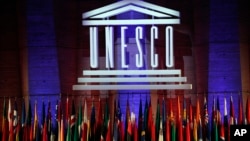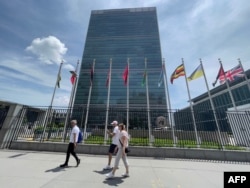On June 12, the United Nations Educational, Scientific and Cultural Organization, or UNESCO, announced that the U.S. plans to rejoin the U.N. agency and pay more than $600 million in back dues.
The U.S. stopped paying its UNESCO dues in 2011 when Palestine joined as a member. At the time, U.S. law prohibited funding to any U.N. agency that implied recognition of Palestinians’ demands for their own state.
On June 13, Chinese Foreign Ministry spokesperson Wang Wenbin criticized the U.S. intentions regarding UNESCO, claiming Washington was treating international organizations like “parks”:
“International organizations are not parks. Countries can’t just come and go as they please.”
That comparison is misleading, contradicting UNESCO’s terms for a country’s membership as stated in Article II of the organization’s constitution.
Article II states that United Nations membership includes a member state’s right to UNESCO membership. A UN member state can quit and then rejoin UNESCO if it pays the organization’s membership fee. In addition, the United States is a UNESCO founding member.
“Membership of the United Nations Organization shall carry with it the right to membership of the United Nations Educational, Scientific and Cultural Organization,” Article II states.
It also says that any “Member State or Associate Member of the Organization may withdraw from the Organization by notice addressed to the [UNESCO] Director-General.” Any United Nations member state can rejoin UNESCO as long as it pays the membership fees it owes for the time it was absent.
The United States is permanent member of the U.N. Security Council and a UNESCO founding member. As such, it is free to rejoin UNESCO at any time. The U.S. has provided 22% of the agency’s funding.
The Chinese Foreign Ministry also ignored the reasons the United States withdrew from UNESCO. The U.S. decided to halt funding to UNESCO after it granted Palestine full membership in 2011.
The U.S. move was required by a law passed in the 1990s prohibiting American funding to any U.N. agency that implied recognition of the Palestinians’ demands for their own state.
As then-U.S. State Department spokeswoman Victoria Nuland told reporters in October 2011, Palestinian membership in UNESCO triggered “long-standing legislative restrictions which will compel the United States to refrain from making contributions to UNESCO.”
In 2018, the administration of then President Donald Trump formally pulled the U.S. out of UNESCO, citing anti-Israel bias and mismanagement. The U.S. remained an observer to the organization.
After the U.S. withdrawal, China increased its annual contribution to UNESCO to about $65 million, becoming its largest donor.
Foreign Policy magazine reported in 2017 that Chinese President Xi Jinping wanted to expand China’s influence in UNESCO because the Beijing saw it “as a vehicle to regulate the global internet.”
In 2013, Brazil, China, Russia, Cuba, Venezuela and 13 other countries submitted a proposal aimed at regulating the internet and positioning UNESCO “strategically in the international debates concerning cyberspace in the coming years.”
Since then, the U.N. agency has engaged in numerous efforts to regulate artificial intelligence, the internet and other digital platforms, and China has been a key player in these efforts.
Some Western scholars have sounded the alarm over China’s push to lead UNESCO.
In 2017, Foreign Policy quoted a former Obama administration official as saying, “Just think about UNESCO being run by the largest totalitarian power in the world. It is chilling.”
James Lewis, a tech policy expert at the Center for Strategic and International Studies, a Washington-based think tank, said Beijing could push for an internet governance position at UNESCO, mirroring the strict controls that China has over its own internet.
China’s censorship system is more comprehensive and sophisticated than those of any other country.
U.S. Undersecretary of State for Management John Bass said in March that the U.S. absence from UNESCO has strengthened China.
UNESCO is key in setting and shaping standards for technology and science teaching around the world, he said, adding: “[S]o if we’re really serious about the digital-age competition with China … we can’t afford to be absent any longer.”
In December 2022, the U.S. Congress issued a waiver allowing for the U.S. to restart its financial contributions to UNESCO and thereby again become a member of the U.N. body.






